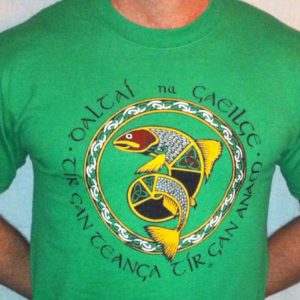Forum Replies Created
-
AuthorPosts
-
Seáinín
ParticipantWhen I first tried to learn Irish, this “how do I pronounce the word I see on the page” thing stumped me and I couldn’t get over the hurdle. The second time I tried I did an online course (Mango Languages) that included decent recordings of every word and phrase being taught. That made the difference for me. That particular system is subscription based, so it might not be accessible to you (although it’s worth checking your local library to see if they are subscribed to it) but now there’s a free online course at http://www.duolingo.com that has decent recordings for some of the words.
I also found the pronunciation system used by the hardcopy dictionary Foclóir Póca useful early on, and there are systems used in some other texts that can help.
Get a course with recordings, whether it’s online or hardcopy, and cut yourself some slack. This is the primary stumper for a lot of beginners. (And I wouldn’t get too hung up on whether the recordings you’re listening to are “natively pure”. You can move more in that direction once you’ve got your linguistic feet on the ground.)
Seáinín
ParticipantI found Wong’s book useful for a while but I rarely refer back to it. For Irish grammars written in English I use Nancy Stenson’s two-volume set or the online tome Gramadach na Gaeilge at http://nualeargais.ie/gnag/gram.htm. There are several grammars written in Irish. The two that I use the most are Gramadach Gan Stró! and Cruinnscríobh na Gaeilge.
Seáinín
ParticipantNá bacaigí leis. Fuair mé ált a mhíníonn an scéal. http://www.beo.ie/alt-beo.aspx
Seáinín
ParticipantThe name of the book you’re referring to is “A Learner’s Guide to Irish” by Donna Wong. I was able to find it in halves (2 pdfs) years ago and merged them together into one. If you can’t find it, email or message me privately and we can arrange to get a copy to you. (It’s about 2 MB in size.)
You might look at programs at the Acadamh in An Cheathrú Rua. (http://www.acadamh.ie/) Many of them include accomodations in the area that have agreements with the Acadamh to only speak Irish with program participants.
Go n-éiri an t-ádh leat!
Seáinín
ParticipantIs bóthar fada é, ‘sea, ach bóthar sásúil freisin.
Go n-éiri an t-ádh leat, a Retro.
Seáinín
ParticipantThe conditional (modh choinníollach) of the verb faigh in the 2nd person singular. Roughly translated to “You wouldn’t get/find a person like him at the party.”
Seáinín
ParticipantSeáinín
ParticipantIn most English-language grammars for Irish these are referred to as “prepositional pronouns”. Here’s a Daltaí page that gives lots of good examples: http://www.daltai.com/grammar/prepositional-pronouns/.
Go n-éirí an t-ádh leat, a Hildegardh!
Seáinín
ParticipantFéach ar an nasc seo le haghaidh “advancing”: http://www.focloir.ie/ga/dictionary/ei/advance?advSearch=1&q=advancing&inlanguage=en#advance__17
Níl aon tagairt den fhocal “dlúmhaí” sa Nua-Chorpas na hÉireann.
Seáinín
ParticipantIs it fun? Will it keep me engaged? Will I learn some Irish?
I find these questions to be more important when I am evaluating Irish language resources for my own learning than whether or not the dialect is pristine native or the grammar foolproof. These things might be useful for me to be aware of, but the answers to the questions above are more important in determining whether I will be successful at moving forward in my language acquisition.
I don’t mention this as a criticism of others’ methods of evaluations, just as another perspective to encourage learners to trust their own judgements about which resources they want to take advantage of.
Seáinín
ParticipantOn current Android phones you don’t need additional software. The Swype keyboard app that comes on most of them can now be set up to work in multiple languages at once. I have mine set to both Béarla agus Gaeilge and as I “swype” it suggests words in both languages, complete with síntí fada and all.
Seáinín
ParticipantI’m not claiming that dubhealaíontoir is a legitimate word, only that there might be some logic in going from dubhealaín to it. Just for fun I searched the New Corpus for Ireland (http://corpas.focloir.ie) and found this quote from a 1996 edition of an Ulster newspaper:
“( is é sin , conas ‘ Cé gur cyberculchie mé le Gaeilge ‘ a chur ag glioscarnach ón tsúil chlé le linn do ‘ Ní Gaeilgeoir mé ‘ a theilgean ón tsúil dheas : dubhealaín dheacair nach dtig leis na dubhealaiontóirí sa Drúid a chleachtadh )”
So at least I wasn’t the first or only one to think this up. 🙂
Seáinín
ParticipantAnd if dubhealaín is “black art, magic”, then a practioner of same might be a dubhealaíontoir.
September 26, 2014 at 11:18 pm in reply to: Review of Buntús Cainte through Actual Irish Dialects: Chapters 10-19 #45497Seáinín
ParticipantI’ve never liked “tá fáilte romhat” — it sounds too Béarlachas. “Ná habair é” is a little dismissive. My favorite way of acknowledging a thanks is the phrase “go ndéana a mhaith duit”. May this thing you are thanking me for do good for you. It acknowledges the favor that has been done and ups the good will another notch.
July 23, 2014 at 8:50 pm in reply to: How to choose a modal of obligation for a given context? #45393Seáinín
Participanthttp://www.focloir.ie/en/dictionary/ei/must?q=must, including the example: “We mustn’t forget it.” Caithfimid gan dearmad a dhéanamh air.
-
AuthorPosts
